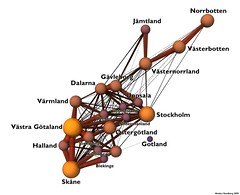February 12, 2009
Using the country as a map of itself
 The physics arXiv blog posts about Simulating Sweden, a paper about MicroSim, a large scale epidemic simulation that contains official data on all registered Swedish inhabitants.
The physics arXiv blog posts about Simulating Sweden, a paper about MicroSim, a large scale epidemic simulation that contains official data on all registered Swedish inhabitants.
The amusing thing with the blog is the shocked tone:
That makes for potentially fantastic simulations but it also raises extraordinary questions over privacy. The data is only minimally anonymized: each individual is given a random identifier but otherwise their personal data is intact.Given that the team is combining data from three different sources, this doesn’t sound like nearly enough protection.
But Brouwers must know what she’s doing. Or at least be praying that the rest of Sweden doesn’t find out what she’s done.
Sometimes it is revealing to see oneself with outside eyes. What would appear to an American as a horrific crime against privacy would most likely be regarded by most swedes as a mildly good thing. After all, figuring out how to deal with avian flu is sensible, right? And the individuals in the simulation have their personal identity numbers replaced with a random code. And the Central Bureau of Statistics has given ethics approval.
Many of the results are eminently useful (just look at these *one million men* cohort studies of the link between IQ and cancer and homicide risk). I might not be in the epidemic simulation, but I am a datapoint in the cohort studies.
We have moved pretty far from project Metropolit in 1986, where the public discovery of a sociological research project that mapped the lives of 15,000 Stockholmers led to its official closure. Today nobody minds that government databases are combined in the population and housing census (which since 2005 has been entirely digital (pdf)). As an article on integrity in Forskning & Framsteg 4/07 (in Swedish) points out, the debate about integrity ended in the 80's (what remains may be more of an educated elite project) and as Swedes' trust in their government has increased, computers became everyday and many useful services have been built on the databases people have simply become used to being mapped. It looks like the classic "boiled frog scenario".
Yet if the aim of the heating is only to keep the frog warm and cozy, the transition might be benign. The problem is that the frog is in a situation where the heat could easily be turned up - deliberately or accidentally. Governments have in the past done this (including the Swedish one). In a situation where people do not trust their government they will at least try to keep track of what it is doing to them, and in a situation where the government is perceived as incompetent people might refuse to give it control over sensitive parts of their lives.
Posted by Anders3 at February 12, 2009 01:17 PM